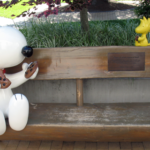(ABP) — This week, former President Jimmy Carter accused a wide swath of President Barack Obama’s critics of being driven by racism. His unfortunate criticism underscored that simplistic views on race are easily hurled into the public domain as a political weapon. But, as is most often the case with racial hyperbole, Carter’s words lacked thoughtful analysis.
He spoke as a son of the South, who, no doubt, has seen race used as a political weapon in his time (some of his critics contend that Carter himself exacerbated racial politics in the pursuit of public office). Conventional wisdom has held that even modern expressions of Southern culture and politics are impossible to divorce from their racist roots.
But like Carter's criticism of President Obama's critics, the reality is more complex.

David Sanders
|
The expansion of the Republican Party in the American South and the region’s deeply held conservative values are often held up by liberals as products of a segregationist past. The region’s political realignment away from the Democratic Party to the Republican Party over the past 50 years is arguably the most profound political shift of any in recent American history, and is the most analyzed and debated by scholars. Some of the newer literature about South’s political shift, however, challenges conventional views that simply characterize the region’s politics as white backlash against desegregation.
Following Reconstruction and well into the mid-20th century, the South was characterized by its intense and virtually monolithic support for the Democratic Party. V.O. Key’s pivotal work Southern Politics in State and Nation (1949) and Alexander Heard’s A Two-Party South? (1952) are credited with predicting that the then-solidly Democratic region could begin changing. Kevin Phillips’ The Emerging Republican Majority (1969) predicted the soon-to-come systematic realignment of the country’s politics — in large part accounted for by the South’s switch to Republicanism.
In spite of the numerous books and journal articles analyzing every angle of the region’s partisan shift, consensus around exactly how and why the realignment took place eludes scholars. Many analysts have searched for the particular “engine of change” that led to the shift.
The body of literature on the subject of Southern political realignment can be grouped into categories and subcategories, but much of the scholarly work should be considered together and not in terms of a single “engine.”
Much of the early literature, of course, suggested that the shift was the response to the region’s prevalent racial unrest, which effectively pushed white Democrats away from the Democratic Party and into the GOP ranks. The premise that race was a major factor in the dramatic growth of the Republican Party in the South was reflected by Case Western Reserve University’s Alexander Lamis in his book The Two-Party South: Southern Politics in the 1990s.
Sign up for our weekly edition and get all our headlines in your inbox on Thursdays
He claimed that early GOP growth was boosted by “white Southern resentment against the Kennedy-Johnson-Humphrey national Democratic integrationists. Southern Republicans sought to ride this resentment to power by tying their state Democratic opponents to the national Democratic Party.” He points out that the strategy didn’t always work, because many Southern Democrats on the state level had “impeccable segregationist credentials.”
Lamis also argues that the transformation of the Democratic Party in the 1960s had as much — if not more — to do with the region’s shift to the GOP.
Other scholars, most notable being brothers Earl and Merle Black, contend that expansion of the franchise through the Voting Rights Act to include a new group of black voters fueled the realignment. Black voters gravitated to the Democratic Party, thereby creating an environment where conservative establishment Democrats began seeking better party-primary chances in the overwhelmingly white GOP.
But more recent literature considers other processes and trends that led to the South’s partisan transformation.
James Glaser of Tufts University argues in The Hand of the Past in Contemporary Southern Politics that, in addition to other factors, “the politicization of evangelical Christians” represents a “major change in Southern electoral politics.” According to Glaser, it is the convergence of the region’s cultural and religious values with political factors that best explains the region’s realignment.
Professors Byron Shafer of the University of Wisconsin and Richard Johnston of the University of British Columbia argue in The End of Southern Exceptionalism: Class, Race, and Partisan Change in the Postwar South that economic development, rather than race, was the main impetus for the region’s political change. They claim the transformation of the Southern economy beginning in the middle of the century led to a dramatic growth in wealth for many Southerners — and social class is a far more significant determining factor than race in voting patterns. Furthermore, they argued, racial desegregation actually held the region’s political shift at bay, rather than pushing it along.
Thoughtful contemplation and analysis are useful in uncovering the real causes, effects and motivations involved in race and politics. This is true of the South and its political evolution, and also it’s true of a president and his critics.
–David J. Sanders is a columnist for Stephens Media in Little Rock, Ark., and the producer and host of the Arkansas Educational Television Network's "Unconventional Wisdom."














We seek to connect God’s story and God’s people around the world. To learn more about God’s story, click here.
Send comments and feedback to Eric Black, our editor. For comments to be published, please specify “letter to the editor.” Maximum length for publication is 300 words.